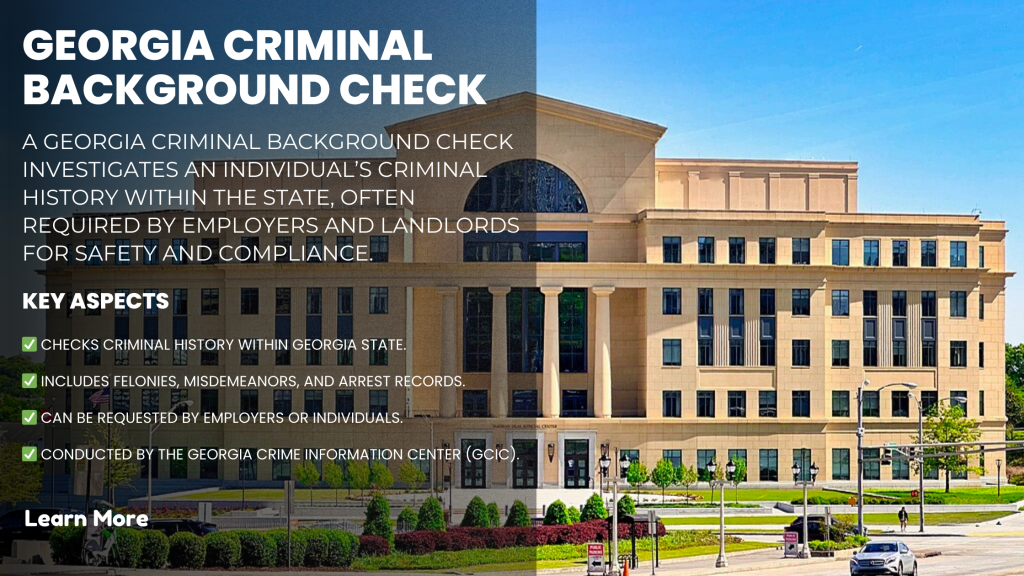What Is a Georgia Criminal Background Check?
A Georgia criminal background check is a process that allows individuals, organizations, or authorities to access an individual’s criminal history in the state of Georgia. This background check includes a record of criminal activity such as arrests, convictions, and pending charges within Georgia’s jurisdiction. Criminal background checks are essential tools used by employers, landlords, law enforcement, and other organizations to evaluate an individual’s criminal history and assess potential risks before making important decisions.
In Georgia, a criminal background check can involve records maintained by state law enforcement agencies, the Georgia Crime Information Center (GCIC), or local county governments. The information obtained from this check can help authorities assess whether an individual has been involved in criminal behavior, allowing them to determine whether a person is suitable for certain roles or privileges.
What Is Included in a Georgia Criminal Background Check?
A Georgia criminal background check includes a variety of records that help form a comprehensive picture of an individual’s criminal history. Some of the key components typically included in these checks are:
- Felony and Misdemeanor Convictions: Any felony or misdemeanor charges and convictions on record.
- Arrest History: Arrest records, including those where charges were dropped or dismissed.
- Pending Charges: If applicable, criminal charges that are still pending in Georgia courts.
- Sex Offender Registry: A list of individuals convicted of certain sex crimes, as required by law to be listed publicly.
- Incarceration Records: Information regarding the individual’s history of incarceration, including any time served in Georgia’s correctional system.
Why Are Criminal Background Checks Important in Georgia?
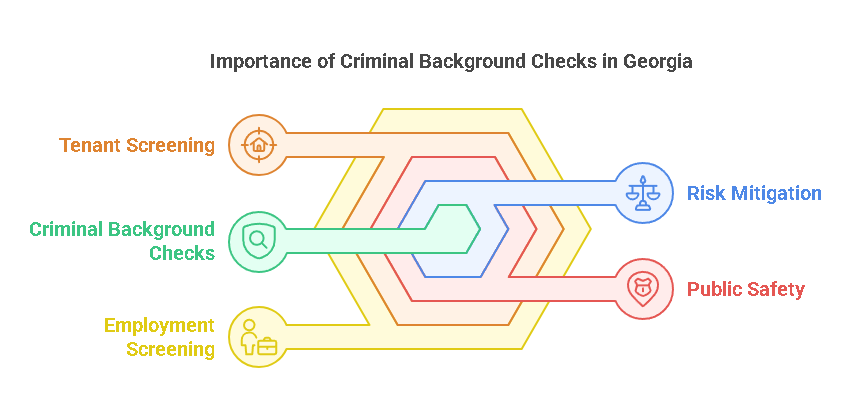
Criminal background checks are crucial in Georgia for several reasons. Employers, landlords, and government agencies use these checks to ensure the safety, security, and compliance of their operations. These checks are used for:
- Employment Screening: Employers in Georgia are increasingly relying on criminal background checks to ensure the safety of the workplace, protect against fraud, and maintain a trustworthy workforce. In many cases, these checks are mandatory for positions in industries like finance, healthcare, and education.
- Tenant Screening: Landlords utilize criminal background checks to vet potential tenants and ensure that they do not have a criminal history that may pose a risk to the safety or security of the property or other tenants.
- Public Safety: Government agencies and law enforcement use criminal background checks to assess individuals’ suitability for security clearances, licenses, or other public services.
- Risk Mitigation: Criminal background checks allow organizations to make informed decisions by assessing whether an individual may pose any risks to others. This is particularly important in industries where employees have access to sensitive information, vulnerable populations, or financial assets.
Types of Criminal Background Checks in Georgia
In Georgia, there are different types of criminal background checks based on the scope of the check and the entity conducting the background search. These can be classified into three main categories:
- State-Level Criminal Background Check: This is the most common type of criminal background check conducted within Georgia. It includes a search through the Georgia Crime Information Center (GCIC) and covers records such as felony convictions, arrests, and misdemeanor charges within the state.
- Federal Criminal Background Check: A federal criminal background check is typically required for positions that involve federal agencies or activities. This search includes federal court records, which may include offenses like interstate drug trafficking, fraud, or immigration violations. In Georgia, individuals may request this check through the FBI.
- Local (County) Criminal Background Check: A county criminal background check focuses on criminal records in a specific county in Georgia. These checks can provide more detailed information about crimes or arrests within a local jurisdiction, such as municipal violations, petty offenses, or local-level misdemeanors.
Who Conducts Criminal Background Checks in Georgia?
Criminal background checks are conducted by various entities in Georgia, each with their own purposes and requirements. Here are the primary groups involved in performing these checks:
- Employers: Many employers, particularly those in sensitive sectors such as healthcare, transportation, education, and finance, require criminal background checks as part of their hiring process. By doing so, employers can ensure they hire candidates with clean criminal records, minimizing potential risks for the business, staff, or customers.
- Landlords: In Georgia, landlords often perform criminal background checks on potential tenants. This is to assess whether a person may have a history that would create a security risk to the property or neighbors. It also helps landlords comply with federal and state laws that protect residents and maintain safe living environments.
- Government Agencies and Law Enforcement: Government agencies and law enforcement entities perform criminal background checks for various reasons, such as security clearance requirements, eligibility for public benefits, or compliance with laws. This can include checks for drivers, professionals working with vulnerable populations, and individuals applying for government assistance.
- Individuals: In some cases, individuals may request their own criminal background check. This is common when a person wants to verify their criminal record before applying for jobs, renting a home, or for personal record-keeping purposes.
How to Obtain a Georgia Criminal Background Check
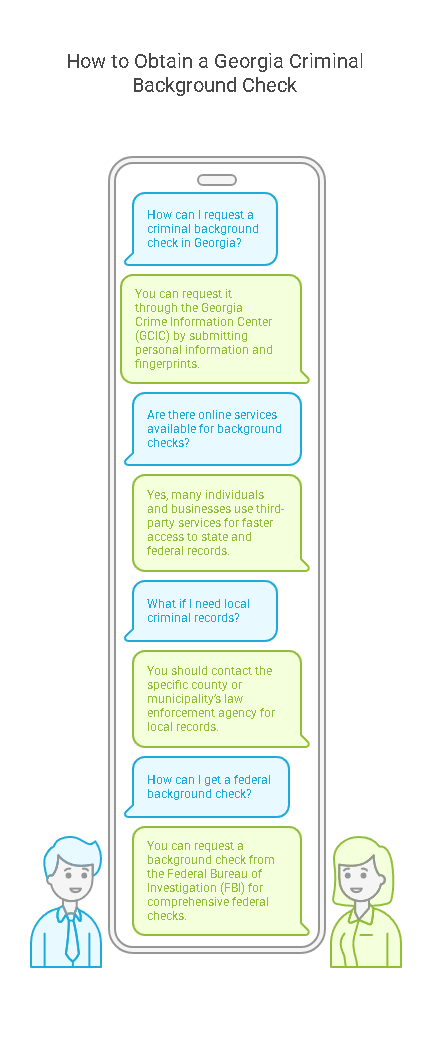
In Georgia, obtaining a criminal background check typically involves a few key steps. Here is an overview of how individuals and organizations can access these records:
- Request Through the GCIC: Individuals can request a criminal background check by submitting a request to the Georgia Crime Information Center (GCIC). This process usually requires the submission of personal information such as full name, date of birth, and a set of fingerprints. Employers may also request this information for employment-related background checks.
- Online Services: Many individuals and businesses in Georgia prefer to use third-party services for faster and more efficient access to criminal background checks. These services may streamline the process by providing instant access to both state and federal records, including arrest and conviction information.
- County or Local Law Enforcement Agencies: For local criminal records, individuals may need to contact the specific county or municipality’s law enforcement agency. These records may not always be included in state-level checks, so county-specific checks may be necessary depending on the applicant’s history.
- FBI Background Check: If a more comprehensive federal check is needed, individuals may request a background check from the Federal Bureau of Investigation (FBI). This is especially important for positions that require federal clearance or involve interstate operations.
Public Access vs. Restricted Access
In Georgia, certain criminal records are available for public access, while others are restricted. Public records can be accessed online or in person, but restricted records, such as certain juvenile offenses or sealed records, may require specific permissions to access. Individuals can also request to seal or expunge their criminal records under Georgia state law.
Georgia criminal background checks are essential tools for employers, landlords, government agencies, and individuals to assess an individual’s criminal history and mitigate risks. These checks include a variety of records, including felonies, misdemeanors, and arrest histories. Accessing these records requires navigating through state, county, and sometimes federal channels, with a focus on compliance and accuracy. The next section will delve into the step-by-step process of conducting a Georgia criminal background check and best practices for employers and landlords.
Step-by-Step Guide to Conducting a Georgia Criminal Background Check
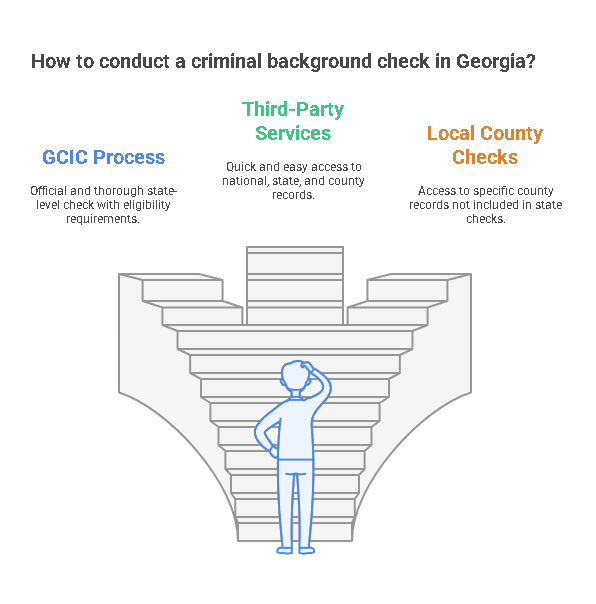
Conducting a Georgia criminal background check involves several steps, which can vary depending on whether you’re requesting the check for personal or professional reasons. Below is a detailed breakdown of how to obtain a criminal background check in Georgia, focusing on the process, necessary documentation, and online services.
1. Requesting a Background Check Through the Georgia Crime Information Center (GCIC)
The Georgia Crime Information Center (GCIC) is the primary state agency responsible for maintaining and providing access to criminal records in Georgia. To request a criminal background check through the GCIC, follow these steps:
- Step 1: Determine Eligibility: Before requesting a background check, ensure that you are eligible to receive the information. For instance, employers, government agencies, and certain professionals are permitted to access criminal records, while private citizens may need to prove the necessity for their request.
- Step 2: Submit Personal Information: To initiate the request, you’ll need to provide personal information, including full name, date of birth, and other identifying details. You will also need to provide a set of fingerprints. This is a crucial step to ensure that the background check is accurate and matches the individual in question.
- Step 3: Choose a Search Type: The GCIC offers different types of background checks, such as state-level and national checks. The choice depends on the scope of the check required. For most employment-related checks, a state-level check is sufficient, but you may need a national check for certain positions.
- Step 4: Submit Payment: There are fees associated with requesting a criminal background check. Be prepared to submit payment, which can typically be done online or by mail. Fees vary depending on the type of check you are requesting.
- Step 5: Wait for Processing: After submission, the GCIC will process the request. The turnaround time can vary depending on the complexity of the check and the method used for submission. Typically, it takes a few business days for results to be processed and sent out.
2. Third-Party Online Services
While requesting a criminal background check through the GCIC is an official and thorough process, many individuals and businesses prefer to use third-party online services for quicker and more streamlined access to criminal records. These services can provide background check results almost instantaneously, and they often include national, state, and county-level checks.
- Step 1: Choose a Reliable Service: There are numerous third-party background check services available, but it’s important to choose a reputable provider. Look for services that are compliant with state and federal laws and those that guarantee up-to-date and accurate information.
- Step 2: Provide Required Information: Typically, you’ll be asked to enter basic information such as the individual’s full name, date of birth, and sometimes their Social Security number. Some services may also require consent from the individual being checked.
- Step 3: Receive Results: Once the background check request is processed, you will receive a report that includes details about the individual’s criminal history. The report typically includes arrest records, felony or misdemeanor convictions, and any other criminal charges.
- Step 4: Additional Services: Many online background check services offer extra features like continuous monitoring or the ability to obtain background checks for multiple individuals at once, which can be beneficial for employers and landlords.
3. Requesting Local (County) Criminal Background Checks
If you need to conduct a local criminal background check in Georgia, you will need to contact the specific county or municipal law enforcement agency where the individual may have a criminal record. While GCIC provides a state-wide record search, some local records may not be included in that search.
- Step 1: Identify the County: If you know where the individual has lived or been arrested, contact the law enforcement agency in that county or city. Local agencies typically maintain their own criminal databases and records, which may not be included in the GCIC search.
- Step 2: Submit a Request: Depending on the county, you may be able to request the records in person, by mail, or online. Each jurisdiction has its own process and fee structure.
- Step 3: Provide Information: Like the state background checks, you will need to provide basic personal information and, in some cases, fingerprints.
- Step 4: Wait for Results: Local background checks may take more time to process compared to state-wide checks, depending on the county and the volume of requests.
4. FBI Background Checks
If you require a national criminal background check, particularly for federal positions or roles requiring federal clearance, you will need to request an FBI background check. This is also important if you are hiring individuals who may have lived outside of Georgia and need a nationwide check.
- Step 1: Submit a Request: To request an FBI background check, individuals must complete the FBI’s Identity History Summary Check. This process requires submitting fingerprints through an FBI-approved channeler or directly to the FBI.
- Step 2: Provide Fingerprints: The FBI requires a set of fingerprints to verify the individual’s identity. The process can be done through a local law enforcement agency, or fingerprinting services may be available at commercial locations.
- Step 3: Receive Results: Once the FBI processes the request, it will provide a report detailing any federal criminal history. This process typically takes several weeks, depending on the submission method.
Best Practices for Employers and Landlords in Georgia
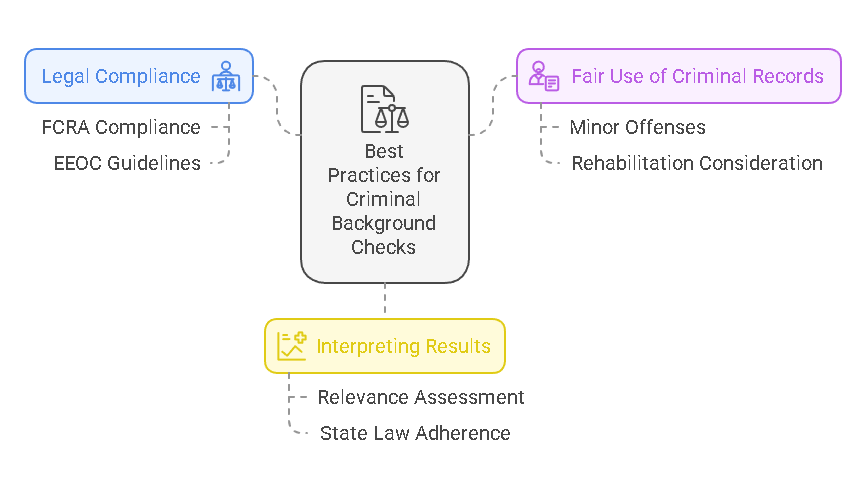
Conducting a Georgia criminal background check is not just about accessing information; it’s also about ensuring that the process is conducted legally, ethically, and in compliance with state and federal laws. Here are some key best practices for employers and landlords when conducting these checks:
1. Legal Compliance
When using criminal background checks, employers and landlords in Georgia must comply with several important legal regulations, such as:
- Fair Credit Reporting Act (FCRA): The FCRA outlines the process for obtaining and using criminal background information in a manner that respects the privacy of individuals. This law requires employers to obtain consent from the individual before running a background check and mandates that individuals be informed if a background check is used to make an adverse decision, such as rejecting an applicant.
- Equal Employment Opportunity Commission (EEOC) Guidelines: Employers must ensure that criminal background checks are used in a way that does not discriminate based on race, color, national origin, sex, or religion. Employers are advised to consider the nature of the offense, its relevance to the position, and how much time has passed since the offense occurred.
2. Fair Use of Criminal Records
Criminal records should be used fairly and responsibly. Employers and landlords must be cautious in how they interpret the results, especially with regard to minor offenses, older convictions, or cases where an individual has completed rehabilitation. It is essential to avoid making blanket assumptions based solely on a criminal record.
3. How to Interpret the Results
When reviewing criminal background check results, it’s important to:
- Assess the Relevance: Consider how the individual’s criminal history is related to the job or rental situation. For example, a misdemeanor drug charge may be less relevant for a position in an office setting but may be more significant in a healthcare or transportation role.
- Follow State Laws: Georgia law places certain restrictions on what can be considered during the hiring or renting process, including specific rules on expunged or sealed records. Make sure you comply with these restrictions when interpreting results.
Precisehire’s Services for Criminal Background Checks in Georgia
Precisehire offers a streamlined solution for employers, landlords, and individuals who need criminal background checks in Georgia. With automated systems, Precisehire simplifies the process, ensuring fast turnaround times and accurate results. The company ensures that its background checks comply with both state and federal regulations, providing businesses and individuals with the confidence that they are making informed decisions.
Precisehire provides compliant, thorough, and reliable checks, making it the ideal solution for those who need to ensure accuracy and legal compliance when conducting background screenings in Georgia.
Types of Criminal Background Checks in Georgia
| Type of Background Check |
Description |
Process |
Scope |
Time to Process |
Cost |
| State Criminal Background Check |
A search of criminal records maintained by the Georgia Crime Information Center (GCIC). |
Request through GCIC online portal or by mail. |
Statewide (Georgia) |
Few business days |
Varies (approx. $20-$25) |
| County Criminal Background Check |
A search of criminal records held by local county or municipal courts. |
Contact local law enforcement agencies. |
Local (specific county or city) |
Few days to weeks |
Varies by county |
| National Criminal Background Check |
A search of federal criminal records and records from all U.S. states. |
Request through FBI or third-party services. |
Nationwide |
2–6 weeks |
$18–$50 (varies) |
| FBI Criminal Background Check |
A comprehensive check using the FBI’s Identity History Summary database. |
Submit fingerprints to FBI or third-party provider. |
Nationwide (Federal) |
3–6 weeks |
$18–$50 |
| Third-Party Background Check |
A background check provided by online services or third-party vendors. |
Request via online platforms. |
Statewide or Nationwide, depending on the service |
Instant to few hours |
$30–$100 (varies) |
Legal Aspects of Criminal Background Checks in Georgia
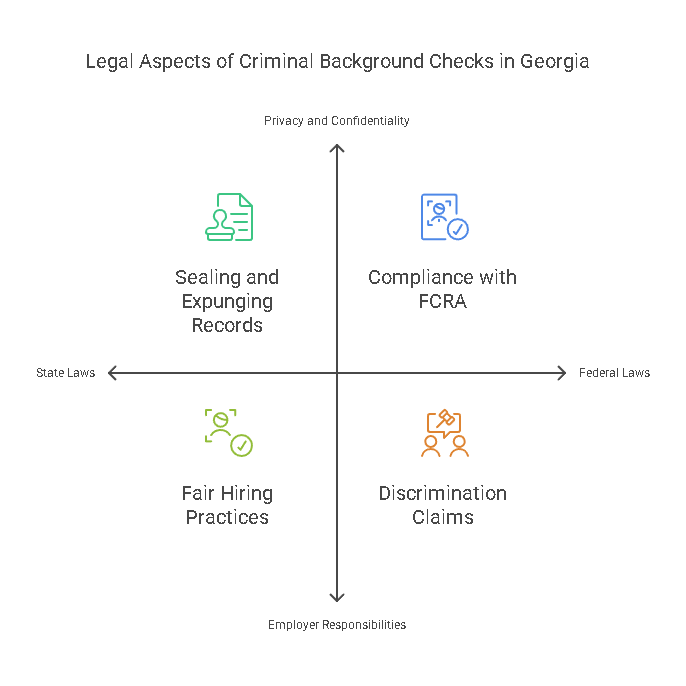
When conducting Georgia criminal background checks, it’s crucial to consider both state and federal laws. Employers, landlords, and other entities must follow legal guidelines to ensure the process is fair, transparent, and compliant. In this section, we’ll explore the key legal aspects that govern criminal background checks in Georgia.
Georgia State Laws on Background Checks
In Georgia, criminal background checks are subject to a range of state laws. These laws govern how records can be accessed, what can be reported, and for how long these records can be retained.
- Retention of Criminal Records: Criminal records in Georgia are maintained indefinitely unless they are expunged or sealed. However, certain records are restricted by law, such as juvenile offenses, which may not be disclosed except under specific circumstances.
- Sealing and Expunging Criminal Records: Georgia law allows individuals to request the sealing or expungement of certain criminal records. This process can remove the record from public access, making it unavailable in background checks. However, not all criminal convictions are eligible for expungement. Felony convictions, for example, are generally not eligible unless specific conditions are met.
- Statewide Criminal History: While county-level criminal checks may only reveal offenses within a particular jurisdiction, a Georgia state criminal background check provides access to records maintained by the Georgia Crime Information Center (GCIC). Employers can request these checks to gain insights into an individual’s statewide criminal history.
Employer Restrictions
Georgia law places certain restrictions on how employers can use criminal background checks during hiring processes:
- Ban-the-Box Laws: Georgia does not have a statewide “ban-the-box” law, but some cities and counties may have ordinances restricting employers from asking about criminal history on job applications. This means that certain employers in Georgia may only inquire about criminal history after the candidate has passed an initial screening or interview.
- Timing of Criminal Record Consideration: Georgia employers are prohibited from automatically disqualifying candidates based solely on a criminal record. They must consider the nature of the offense, the time that has passed, and whether the offense is relevant to the position.
- Felony Offenses and Specific Restrictions: Some industries in Georgia have specific restrictions related to criminal background checks. For example, businesses in finance, healthcare, and education may have stricter requirements. Felony convictions, particularly those involving violence, may disqualify an individual from certain positions, but each case must be considered on its individual merits.
Privacy and Confidentiality Laws
Protecting the privacy of individuals undergoing a Georgia criminal background check is a serious concern, and the state has specific privacy laws to ensure this:
- Georgia Open Records Act: Criminal records in Georgia are subject to the Open Records Act, which makes most criminal records public. However, certain exceptions apply, particularly for juvenile records and expunged or sealed records.
- Fair Credit Reporting Act (FCRA): The FCRA is a federal law that regulates how employers and others can obtain and use consumer information, including criminal background checks. Under the FCRA, individuals must be notified and give consent before a criminal background check is conducted. Employers must also provide applicants with a copy of the report if they decide not to hire them based on the results.
- Confidentiality of Records: While criminal records can be accessed publicly, employers must handle these records with care. They cannot share the information with third parties or use it for discriminatory purposes.
Liability Issues for Employers
Employers who fail to follow proper procedures when conducting criminal background checks may face legal consequences. Violations of state and federal laws can lead to lawsuits, fines, and penalties. Some key points to consider:
- Discrimination Claims: Employers must ensure that criminal background checks are applied uniformly and do not disproportionately affect certain demographic groups, particularly based on race or ethnicity. Discriminatory practices can lead to claims under the Equal Employment Opportunity Commission (EEOC) guidelines.
- Fair Use of Information: Employers must use criminal background check results fairly. For example, they should not rely solely on a criminal record to disqualify an applicant without considering the nature of the crime and how it relates to the job.
- Failure to Comply with the FCRA: Employers must adhere to the FCRA, which includes obtaining written consent from the candidate, providing the candidate with a copy of the background check results, and offering a chance to dispute any inaccuracies. Failure to comply can lead to significant fines.
Frequently Asked Questions (FAQs)
The processing time for a Georgia criminal background check depends on the type of check being conducted. State background checks through the Georgia Crime Information Center (GCIC) typically take a few business days. FBI checks or checks through third-party services may take longer, typically 2–6 weeks.
A Georgia criminal background check will show records of arrests, charges, and convictions. This includes felonies, misdemeanors, and, in some cases, pending charges. However, juvenile records are generally not disclosed unless specific conditions apply.
Yes, individuals can challenge the results of a criminal background check in Georgia. If there are errors or inaccuracies in the report, the individual can request a correction from the relevant agency or report the discrepancy to the Georgia Crime Information Center (GCIC). It is important to act quickly and provide any necessary documentation to support the claim.
In Georgia, a criminal background check can go back as far as the records are available, which can be indefinitely unless the record is expunged or sealed. However, some employers may only review records from the past 7-10 years, depending on the position.
To obtain a copy of your criminal background check in Georgia, you can request it from the Georgia Crime Information Center (GCIC) or the Georgia Department of Public Safety. You may need to submit fingerprints and personal identification documents to complete the process.
Conclusion
In conclusion, Georgia criminal background checks are vital tools used by employers, landlords, and law enforcement agencies to ensure public safety and compliance with legal requirements. They help assess the risk involved in hiring individuals or renting property to tenants with criminal histories. However, it is essential that these checks are conducted fairly, legally, and in compliance with both Georgia state laws and federal regulations.
Employers and landlords in Georgia must navigate the complex landscape of background checks carefully to avoid legal pitfalls. Services like Precisehire provide valuable support in conducting background checks, ensuring both compliance and accuracy. By leveraging these services, individuals and organizations can streamline their screening processes while maintaining fairness and transparency.
Whether you are an employer, landlord, or individual seeking a criminal background check, understanding the laws and processes involved in Georgia is crucial to making informed and responsible decisions.
